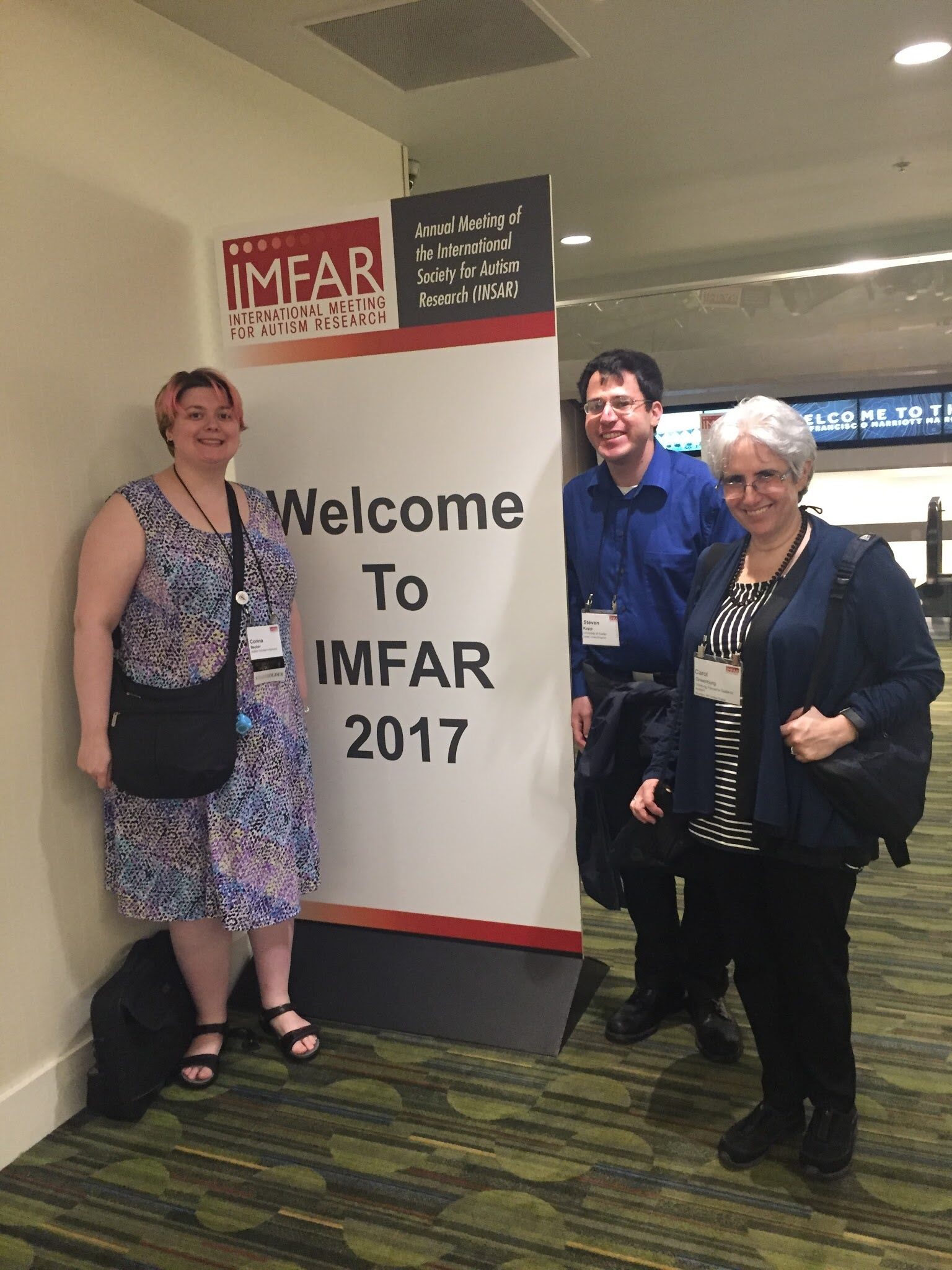Shannon Des Roches Rosa Senior Editor, TPGA Welcome to IMFAR 2017! [image: three white autistic folks: Corina Becker, Steven Kapp, & Carol Greenburg, posing by the “Welcome to IMFAR 2017” sign.] We have been reporting from IMFAR, the annual International Meeting for Autism Research, since 2011. This year we provided general live coverage via Twitter, with select roundups including the Press Conference, and highlights from sessions such as Autism and Aging, Understanding Barriers to Autism Diagnoses for Children from Racial/Ethnic Minority Groups in the U.S., Mental Health Crises in Autistic Youth, and Autism and Sexuality. We also co-hosted the #AutIMFAR chat with autistic and autism research community members. While the research presented at IMFAR continues to be varied in scope, and is still too disproportionately skewed towards prenatal, infant, and early childhood findings, our takeaway is that the 2017 meeting in San Francisco had the biggest increase in neurodiversity-oriented content and attendees we’ve seen so far.…
Tag: research
IMFAR 2017: Mental Health Crises in Youth with Autism Spectrum Disorder Storify by Shannon Rosa Sat, May 13 2017 21:08:54 Edit IMFAR 2017: Mental Health Crises in Youth with Autism Spectrum Disorder Clinical experience suggests such crises occur frequently among individuals with an Autism Spectrum Disorder (ASD). Despite the scope and impact of this issue, there is no systematic research on the measurement or management of mental health crises in individuals with ASD. Content note: Discussion of mental health issues, including suicide and other self-harm. ThinkingAutismGuide@thinkingautism Now: Mental Health Crises in #autistic youth. #IMFAR2017 Sat, May 13 2017 17:31:17 ReplyRetweetFavorite First speaker: Session chair L. Kalb: Psychometric Analysis of the Mental Health Crisis Assessment Scale in Youth with Autism Spectrum Disorder AutismWomen’sNetwork@autism_women Psychometric Analysis of the Mental Health Crisis Assessment in [Autistic] Youth #IMFAR2017 Sat, May 13 2017 17:33:36 ReplyRetweetFavorite ThinkingAutismGuide@thinkingautism What = mental health crisis? Settled on APA def:…
Photo © Gayan Gunawardana | Creative Commons [image: Backlit photo of a sad ponytailed person with their head down, in profile in front of an ocean sunset.] Dr. Sarah Cassidy co-chaired a SIG (Special Interest Group) on Autism and Suicidality at IMFAR 2016, in Baltimore. We weren’t able to attend her session, but Dr. Cassidy was kind enough to take time, later that same day, to talk with TPGA editors Shannon Rosa and Carol Greenburg, autistic autism researcher Dr. Steven Kapp, and Autistic Self Advocacy Network Executive Director Julia Bascom. The following is a transcript of our conversation. —- Shannon Rosa: Tell us about what you discussed in the SIG. What has your research revealed about suicidality in autistic people? Dr. Cassidy: We’ve published two studies so far. The first study we did, which is free to access in the new Lancet (Psychiatry) journal, was a medical chart review, a…
Dr. Deb Karhson is a postdoc at Stanford University, where she researches biology-rooted therapeutic approaches to improving autistic quality of life. She is also the “baby sib” of an older autistic brother. We are looking forward to having Dr. Karhson as a featured researcher during this week’s #AutIMFAR chat at IMFAR, the International Meeting for Autism Research. Even better, we got to interview her beforehand: Dr. Deb Karhson [image: Smiling Sri Lankan/Nigerian-American woman with long curly black hair pushed to one side, wearing glasses & hoop earrings.] TPGA: Tell us about your research: What is your focus? Dr. Deb Karhson: Broadly my current work is focused on biomarker discovery and drug development in for autism, which simply put means I’m looking for objective, testable, biological signatures of autism and whether candidate biomarkers can be leveraged for biotherapeutic development. And specifically, that means I’m interested in understanding the role of the…
Even though IMFAR is all about autism, researchers don’t always connect with #autistic concerns. Hence the #AutIMFAR Twitter Chat at IMFAR 2017, which was a conversation among autistic community members and autism research community members (with plenty of participants who were both). The onsite #AutIMFAR chat crew! Fab convo w/autistic and autism research folk. [image: hotel conference room gathering of autistic & non-autistic researchers and community members, of various genders & races, mostly white.] #AutIMFAR chat was a partnership with #autchat, The Autistic Self Advocacy Network, Autism Women’s Network, NOS Magazine, and Thinking Person’s Guide to Autism. We provided pre-chat guidelines and details. [image above: The Twitter logos for five organizations: autchat: a rainbow background with a black infinity symbol and black text reading: “#autchat“; The Autistic Self Advocacy Network: a spiraling rainbow heptagon on a white background; Autism Women’s Network: a pink lowercase “a” overlaid on a light-blue-and-brown illustrations of dragonflies and flowers, above…
A delighted announcement: TPGA is partnering with The Autistic Self Advocacy Network (ASAN), NOS Magazine, Autism Women’s Network (AWN), and autchat to host #AutIMFAR: a Twitter-based conversation between autism researchers and autistic community members. #AutIMFAR Partner Orgs: autchat, ASAN, AWN, NOS Magazine, and TPGA [image: The Twitter logos for five organizations: autchat: a rainbow background with a black infinity symbol and black text reading: “#autchat”; The Autistic Self Advocacy Network: a spiraling rainbow heptagon on a white background; Autism Women’s Network: a pink lowercase “a” overlaid on a light-blue-and-brown illustrations of dragonflies and flowers, above the lowercase black text “autism women’s network”; NOS Magazine: a black circle on a white background, with an illustration of an incandescent light bulb drawn in white and surround by a sunburst in dashed rainbow colors; and Thinking Person’s Guide to Autism: All-caps black text on a white background reading “Thinking Person’s Guide to Autism,” with “Person’s” in white text on a black arrow.]…
Shannon Des Roches Rosa www.squidalicious.com Photo © Jeffrey Beall | Flickr / Creative Commons [image: Photo of metal letters spelling “Science” affixed to a brick wall.] At a recent workshop on How to Find Autism Information That Will Help You, I noted that a key factor for evaluating an autism resource is: Who does the approach primarily benefit? Autistic people themselves, or people affiliated with autistic people, such as families or teachers? It’s important to identify this aim, because approaches that support autistic people in living lives of maximized happiness and potential can be very different from the parent-centered approaches—which too often portray autistic people as problems to be managed and controlled. We at Thinking Person’s Guide to Autism support the helping approach, and routinely criticize the problem/control approach—an ongoing effort as the latter remains pervasive both in popular culture, and in research. The problem/control approach is also a theme…
M. Kelter theinvisiblestrings.com MIT researchers recently announced that they are developing a wrist watch which analyzes a conversation, then provides feedback about the emotional content of the discussion. Though the watch is still early in development, MIT’s press for the device suggests it may one day provide autistics with a better way to grasp the subtle nuances of communication — basically, as a social coach. Photo © AndreaVallejos | Flickr / Creative Commons [image: Photo of a metal toy robot.] Similar efforts have emerged in the world of social robotics, where it is postulated that autistic children can learn to socialize with the help of mechanical “friends,”that is, robots programmed to teach kids to identify emotions, facial expressions, and so on. Like the watch, these coaching devices are envisioned as being able to bring autistics in line with conventional standards of daily social behavior. I have no doubt that the intentions here…
Shannon Des Roches Rosa with Carol Greenburg Your faithful TPGA editors spent most of last week in Baltimore, Maryland at IMFAR, the International Meeting for Autism Research. We gleaned as much as we could from the 2000 scientists, professionals, autistic people, and family members from all over the world who spent three full days talking about the most current findings and trends in autism research. But we didn’t cover everything or meet everyone we wanted to, because doing so is not physically possibly without a Time Turner. (If you ever want to experience abject FOMO — fear of missing out — by all means, go to IMFAR.) Overview Ninety-nine percent of the researchers at IMFAR are the nicest, most well-meaning scientists one could ever meet, which makes for a friendly atmosphere. We were happy to see significant progress on some research fronts: only a single presentation about vaccines, and it…
Photo © Bobby Wade/Flickr [image: White woman with long brown hair and glasses, giving a presentation at a TEDx autism conference.] Our editors Carol and Shannon are spending the latter half of this week at IMFAR, the International Meeting for Autism Research, which is May 11 – 14 in Baltimore, MD. If you’re going, say hi! You can also follow us on Twitter at @ThinkingAutism, @ShannonRosa, and (Carol) @AspieAdvocate. IMFAR has improved a lot: We are glad to see the annual conference welcome increasing numbers of autistic speakers and attendees, so that autism researchers can listen to the people whose lives they are studying (and ideally trying to benefit), and vice versa. But since our editorial roles include being autism research ethics gadflies, we have to note that IMFAR is still mostly about the medical model view of autism and disability (curing and fixing), rather than the social view (understanding…







